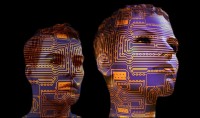A Pew Research study finds the public has a cautionary attitude toward artificial intelligence and human enhancements, with concerns about potentially unintended consequences of autonomous machines, and fear of what accelerated change in these areas might mean for society. The survey of more than 10,250 U.S. adults in November 2021 examined opinions of six technologies broken down into two categories: AI and bioengineering, with crossover in the area of AI-enhanced exoskeletons. Across all categories, a majority believe that federal government and “end users” should be involved — along with the creators or inventors — in setting standards.
The findings, summarized on the Pew Research website, underscore that public opinion is “often contingent on the goals and circumstances around the uses of AI and human enhancement technologies. The Pew team also notes “correlations between acceptance of a given technology and a person’s religious affinity and level of education.”

The categories and opinions break down as follows:
Police Use of Facial Recognition — “Respondents largely believed that continued use in law enforcement would ‘likely help find missing persons and solve crimes,’ but also conceded that ‘it is likely that police would use this technology to track everyone’s location and surveil Black and Hispanic communities more than others,’” writes Engadget. Forty-six percent found widespread use of facial recognition by police would be a “good idea.”
Social Media Algorithms — About 38 percent approved of using algorithms to moderate social media, while the remaining 62 percent “were split evenly between ambivalence and thinking it would be bad for society,” Engadget reports, adding that, “unsurprisingly, opinions on this matter skew heavily depending on the respondent’s political affiliation. Majorities of both Democrats and Republicans agree that ‘political censorship and wrongful removal of information are definitely or probably happening as a result of the widespread use of these algorithms.’”
Autonomous Vehicles — “Widespread use of driverless passenger vehicles is a bad idea for society by an 18-point margin (44 percent bad to 26 percent good), with nearly a third of people unsure,” per Engadget. Questions included the impact on professional drivers and whose safety should be prioritized, passengers or pedestrians.
Brain-Computer Interfaces — Fifty-six percent feel the “widespread adoption of BCIs will be a bad thing for society,” says Engadget, noting “78 percent are against having one installed, versus 20 percent actively in favor.” More men than women professed a willingness to “get chipped” (20 percent to 6).
Gene Editing — Almost half (49 percent) “would decline to have their child’s genome edited to prevent hereditary diseases,” Engadget writes, adding that “52 percent believe that such edits would be ‘crossing a line we should not cross’ compared to 46 percent who say it is in line with previous efforts at augmenting human capabilities.”
Robotic Exoskeletons — “Only a third of people think the adoption of exoskeletons like the Cray X from German Bionic would lead to better working conditions while 31 percent of those surveyed thought it would make matters worse,” Engadget explains. About 33 percent of people feel these systems would help improve society, while 24 percent say the influence of such technology would be negative (with 57 percent admitting to no previous knowledge of exoskeletons informing their opinion).

No Comments Yet
You can be the first to comment!
Sorry, comments for this entry are closed at this time.